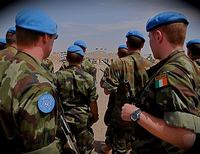The future direction of European defense is at a crossroads. On the one hand, the NATO experience in Afghanistan has cast into stark relief the limits of European military capacities, not only at the operational but also at the political levels. On the other hand, the recently enacted Lisbon Treaty offers important new opportunities to improve European defense capabilities, especially at the institutional level. If the European Union is to establish itself as a credible security actor on the global stage, European governments will need to improve the way they work together on defense. But the biggest obstacle they face is overcoming the persistent lack of political will to do so.
Afghanistan Highlights European Shortcomings on Defense
In a recent speech about the future of the transatlantic alliance, U.S. Secretary of Defense Robert Gates told an audience filled with military officers from NATO's 28 member countries, "The demilitarization of Europe -- where large swaths of the general public and political class are averse to military force and the risks that go with it -- has gone from a blessing in the 20th century to an impediment to achieving real security and lasting peace in the 21st century."

